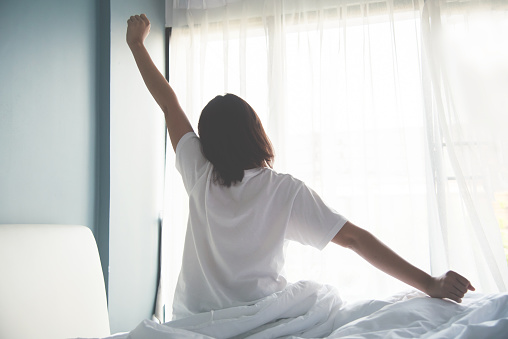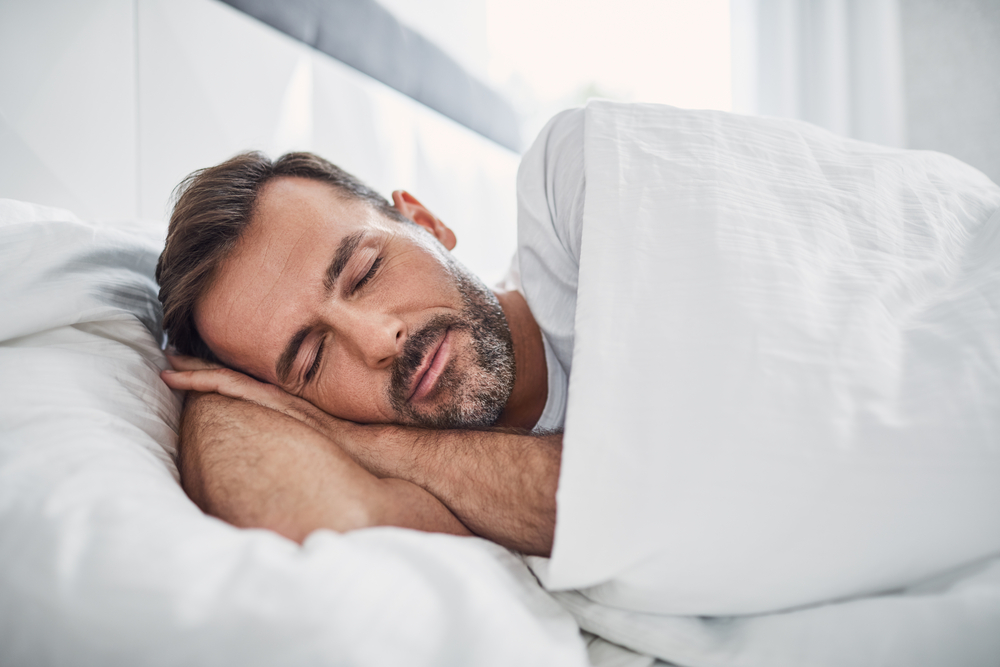
Sleep peptide Pro – something to dream about
October 17th, 2017Did you get a good night sleep last night? Or were you counting sheep?
The main facts about human life are 5 – birth, food, sleep, love and death. It’s now clear that sensible eating and a solid night’s sleep are the two vital elements for a healthy life. At the end of the day, we all want to look good and feel good. Sleep deprivation has profound consequences on your wellbeing. It can put you at risk of obesity, heart disease, diabetes and other potentially life threatening conditions. Sleeping Beauty had the right idea, look at her when she woke up – full of life and vitality, a healthy weight, wrinkle free and she ended up with the perfect life! However, she didn’t have bills to pay, have a family to feed or a day in front of a computer screen. Some could say that she had a bit too much sleep of course.
Do you get enough sleep? As a rule, if you wake up tired and spend the day longing for a chance to have a nap, it’s likely that you’re not getting enough sleep. Sleep gives us time to rest and rebuild.
Is a great night sleep something that you dream about?
There are 3 stages of sleep. 1. Non-REM sleep – drowsiness, your eyes move slowly under your eyelids, your muscles start to relax and you are easy to wake up. 2. Non-REM sleep – light sleep, your eye movement’s stop, your heart rate slows, and your body temperature drops. 3. Non-REM sleep – deep sleep, it’s not easy to wake you during this stage of sleep. If you do wake you will be groggy and not quite with it for a few minutes. This kind of sleep allows your brain to rest and restores your energy levels and your immune system is helped by deep sleep. Finally, there is REM sleep – rapid eye movement sleep. About 70-90 minutes into your sleep cycle is when you enter your REM sleep. This stage is associated with processing your emotions, filing your memories and relieving stress. Your blood pressure drops, muscles relax, blood supply to the muscles increases and muscle tissue growth and repair occurs. Energy is restored and hormones are released. (1)
What is stopping you from getting a great night sleep?
Taking into consideration the valuable benefits of good sleep it’s very important that you find out why you aren’t sleeping well. What is preventing you from getting the recommended minimum 7 hours sleep a night? W.C Fields once said, “The cure for an insomniac is a great night’s sleep.” It’s true, but life isn’t that simple. And, there isn’t one answer for all. Whatever your reason for not sleeping is, your goal should be to find out why and devise a realistic plan of action to give your body what it needs to function at its best. We live in a world of information overload and the long and the short of it is, a lack of sleep can create a whole lot of problems and shorten your life expectancy. If you struggle to get a good night’s sleep there are different therapies that you can try. There are many benefits of a sleep aid, it reduces anxiety and stress, helps depression and restores the body to a state of calm and relaxation to promote deep sleep. Sleep peptides aid the circadian rhythms in the brain, when those rhythms are disrupted; your body produces less melatonin. You need a good melatonin level to achieve good sleep. (2)
Do you suffer from Insomnia?
Insomnia is difficulty getting to sleep or staying asleep for long enough to feel refreshed the next morning. It’s an exhausting and a common problem particularly in elderly people.
Occasional bouts of insomnia may come and go without causing any serious problems, but for some people it can last for months or even years at a time. Insomnia can have a significant impact on your quality of life. It can restrict what you’re able to do during the day, affect your mood swings and lead to relationship problems with friends, family and colleagues. To be able to put your head on the pillow and float into a deep sleep is something an insomniac will struggle to ever experience.
Doctors are reluctant to prescribe sleeping tablets, this is because they don’t treat the cause of your insomnia and are associated with a number of side effects. They can also become less effective over time. (3)
Are you a night owl or early riser?
Do you know your chronotype? This describes a person’s timing preference and their potential for awareness within different times of the day. Are you the early riser chronotype? Up and ready for action at the crack of dawn, going for a jog whilst others sleep like babies in their beds. Or are you the night owl chronotype? Hates mornings and is not enthused but come late evening the brain is switched on and ready to go.
We should all aim to be the intermediate chronotype – somewhere in the middle. A flexible person who can have mental alertness where needed. (4)
What’s going through your head right now?
Well, if you are reading this article at bedtime, unless otherwise stimulated, your cortisol levels are dropping, your body temperature is lowering and as you start your sleep cycle the melatonin, seratonin and growth hormone levels will go up. Melatonin suppresses harmful free radicals and slows down the production of oestrogen which can activate cancer.
The amount of cortisol and catecholamines produced from the adrenal rises through the night from its lowest point when going to sleep, to its highest point upon awakening. Catecholamines and cortisol play a large part in the ‘bright eyed and bushy tailed’ behaviour you sometimes experience in the morning. However, a low level of cortisol can cause grogginess on wakening.
If you are reading this article because it’s the middle of the night and you can’t sleep, the stress hormone cortisol is raising leading to less new brain cell growth. Your insulin levels in your blood are rising, leading to hunger. There is a decrease in growth hormone leading to less body and brain restoration and leading to accelerated aging. Potentially you are aggravating a stomach ulcer and increasing the risk of cancer.
What can you do to get a better night’s sleep?
The inability to sleep could be caused by negative emotions, an increase in stress hormones resulting in overactive adrenals, eye problems or using cell phones, computers or TV before bedtime. So what can you do to make sure that you get enough ZZZs!
- Sleep in darkness
- Have your room at a comfortable temperature
- Make sure there are no magnetic fields in the room
- Keep alarm clocks with bright lights away from the bed
- Avoid a loud alarm noise
- Reserve your bed for sleep, not watching TV or working
- Sleep in separate bedrooms if your partner snores
- Reduce or avoid drugs near bedtime
- Avoid alcohol
- Avoid caffeine
- Exercise regularly
- Get some sunshine!
- Have your adrenals checked
- Don’t eat foods that you are sensitive to
- Try not to be overweight
- Therapy
- Remove any blue lights from the room – TV or computer screens
- Take a sleep aid, like Sleep Peptide Pro
Sleep Peptide Pro is a deep sleep peptide dietary supplement that contains- CAP (Circadian Adjustment Peptide). When circadian rhythms in the brain are disrupted, your body produces less melatonin. You need a good melatonin level to achieve good sleep.
CAP- Can inhibit the secretion of hormones in the hypothalamus of the brain (this links the nervous system to the endocrine system via the pituitary gland). In doing this it helps reduce the adrenal secretion of large amounts of cortisone that is recognized as being a contributing factor in sleep disorders. By reducing the amount of cortisone it helps to restore the body to a state of calm and relaxation.
The use of ultrafiltration membrane purification, the development of peptide orientation fermentation technology, the production of high milk peptides, and the high concentration and purity of amygdalin CAP, allows the capsule to remain intact in the intestine allowing it to fully absorb into the system. (5)
Sleep has been provided by nature to do the body’s healing work and it takes 7 or 8 hours for this process to happen. You should try to commit to getting at least 7 hours sleep at night to keep your body and hormones in balance. Experts say, for every two hours that we are awake, the brain needs an hours sleep.
Sleep routines may include taking a warm bath or a relaxing walk in the evening or practicing meditation/relaxation exercises. Psychologically, the completion of such practice tells your mind and body that the day’s work is over and you are free to relax and sleep.
When sleeping, your brain is extraordinarily active. Much of that activity helps the brain to learn more and remember. Sleep helps you remember forgotten skills because the brain goes through a consolidation period.
Sleeping plays a crucial role in helping us to grasp the meaning of our lives. Are you having trouble making sense of your life? Do you find yourself forgetting things more often? Is it taking you longer to learn more skills than it used to?
It’s about knowing how to sleep well and how to do it.
Why not sleep on it and see what happens…
References:
- WebMD, reviewed by William Blahd MD, National Institutes of Health, National Sleep Foundation.
- org. Harvard Health Publications. In consultation with Lawrence Epstein MD, instructor in medicine – division of sleep medicine.
- Shelby Freedman Harris Psy.D, C.BSM. Director of behavioral sleep medicine program at the Sleep-wake Disorders Center at Montefiore Medical Center. ‘What do you do if you suffer from middle of the night insomnia?’.
- Dr Michael J Breus – The Sleep Doctor. ‘Night owls and early risers have different brain structures’.
- ‘Sleep’ – How sleep works.com. ASA (American Sleep Association), supported by Dr Everett Koop.






